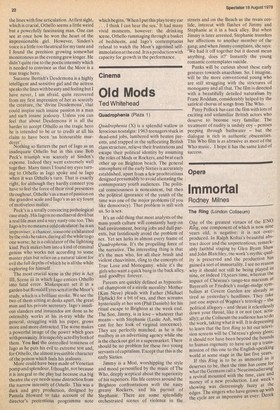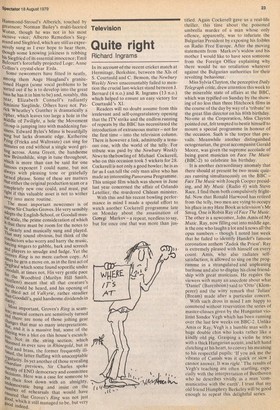Opera
Immortal
Rodney Milnes
The Ring (London Coliseum) One of the greatest virtues of the ENO Ring, one component of which is now nine years old, is negative: it is not overproduced. In Ralph Koltai's beautiful abstract decor and the unpretentious, remarkably faithful staging by Glen Byam Shaw and John Blatchley, the work's mythic quality is preserved and the production has gained a sort of immortality. I see no reason why it should not still be being played in nine, or indeed 19,years time, whereas the impact of Chereau's tango-tea marxism at Bayreuth or Friedrich's nudge-nudge symbolism at Covent Garden are already as tired as yesterday's headlines. They take just one aspect of Wagner's tetrology — the political allegory — and thrust it relentlessly down your throat, like it or not (not, actually); at the Coliseum the audience has to do the work, taking what it will. It is depressing to learn that the first Ring to hit our television screens will be Chereau's glossy gloss; it should not have been beyond the bounds to human ingenuity to have set up a transmission of this one to the English-speaking world at some stage in the last five years: If this Ring is to be as immortal as it deserves to be, then the time has come tor, what the Germans call a 'Neueinstudierung a revival mounted with the time, care and money of a new production. Last week's showing was distressingly fuzzy at the edges. The singers who have grown up with the cycle are as impressive as ever: Derek Hammond-Stroud's Alberich, touched by greatness; Norman Bailey's multi-faceted Wotan, though he was not in his most incisive voice; Alberto Remedios's Siegmund and Siegfried, which are still as expressively sung as I ever hope to hear them, though some knowing jokiness is robbing his Siegfried of its essential innocence; Emil Belcourt's forcefully projected Loge; Anne Collins's crystal-clear Erda. Some newcomers have fitted in neatly, among them Aage Haugland's granitetoned Hagen (some vocal problems to be sorted out if he is to develop into the great bass he has it in him to be) and, notably, this Year, Elizabeth Connell's radiantly felninine Sieglinde. Others have not. Patrick Wheatley's Gunther is dramatically a Cipher, which leaves too large a hole in the middle of Twilight, a hole the Movement group is jumping into with maddening fussMess, Edward Byles's Mime is beautifplly .hsnog but lacks dramatic edge. Katherine 'ring (Fricka and Waltraute) can sing for Minutes on end without a single word getting across. Anna Green, the handsome new Brdnnhilde, sings in tune throughout, Which is more than can be said for one fatuous exponent I could name, but not always with pleasing tone or gratefully tilrhed phrase. Some of these are matters that either the original production team or a en. thPletely new one could, and must, put right if this valuable asset is not to wither away into mere routine, The most important newcomer is of 'nrse Sir Charles Groves. He very sensibly a.dopts the English-School, or Goodall mus!cal scale, the prime consideration of which It: that there must be room for the notes to Te, Clearly and musically sung and played. uat may sound obvious, but think of the leonductors who worry and harry the music, ,ciretog singers to gabble, bark and screech `,111:1 players to smudge and fudge. Yet the roves Ring is no mere carbon copy. At s,111. es he gets a move on, as in the first act of 6`gfried which some found soporific under f °oda'', at times not. His very gentle pace the Woodbird (Marilyn Hill Smith, kv'vellent) meant that all that creature's 0,6rds could be heard, and his opening of t'lLe third act of Valkyrie, rather steadier 4an Goodall's, paid handsome dividends in clarity. le Most important, Groves's Ring is seam musical corners are sensitively turned c,d there are none of those jolting gear nges that mar so many interpretations. mut,. and it is a massive but, some of the dying was a blot on this house's escutchh, n, Not in the string section, which ‘v?omed as ever save in Rhinegold, but in tuind and brass, the former frequently ill relied, the latter fluffing with unacceptable gular.ity. In yet another of those revealing waardian previews, Sir Charles spoke 41..111.1Y of ENO democracy and committee ,,.etslons. Here was a case for someone to ru_ut, their foot down with an almighty, nu"oemocratic bang and insist on the ens of rehearsals that would have 6'u ,sou.red that Groves's Ring was not just (1, which it still managed to be, but very good indeed.































 Previous page
Previous page